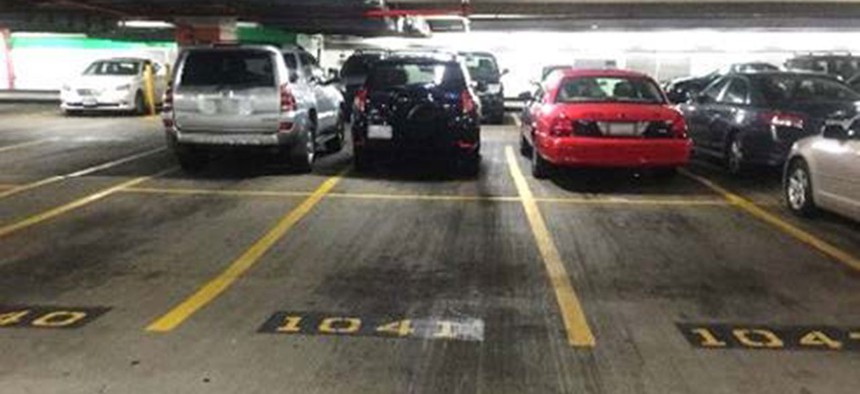
EPA headquarters paid for unoccupied parking spaces. EPA OIG photos
EPA Overspent on Subsidized, Often Empty Employee Parking Spaces
Watchdog says HQ and Atlanta office paid $1.5 million over two years.
The agency with a huge stake in efforts to reduce pollution generated by automobiles has subsidized too many employee parking spaces, many off which went unused, a watchdog found.
The Environmental Protection Agency, at the 24-hour garage at its Washington headquarters and its Atlanta regional office, paid more than $840,000 to offer non-mandatory parking benefits from 2015-2016, according to a report released on Wednesday by the agency’s inspector general. EPA spent an additional $690,000 on leased parking spaces that went unused.
A 2015 executive order on sustainability “touts federal air quality goals, and no law requires subsidized parking to be a mandatory employee benefit,” the IG wrote. “Consequently, the EPA was using valuable resources to subsidize employee parking when the funds could put to better use in mission-critical programs.”
The IG cited statutes and Office of Management and Budget guidance going back to 1984 mandating that agencies pursue efficiencies when offering parking benefits, including govermentwide efforts at shrinking the federal building footprint and President Trump’s March executive order on reducing waste.
At headquarters in the Ronald Reagan Building, a lease agreement with the General Services Administration requires EPA to pay monthly for 344 parking places, the report noted. Some 29 percent of those spaces, auditors found, were unused in 2015-2016. With the subsidy, EPA employees paid $163.45 per month for a parking space,” the report said. “Other tenants paid $319 per month.”
EPA management noted that such an employee benefit is lawful, particularly for employees with “unusual hours,” and that retirements and uncertainty about staff size under the incoming new administration presented challenges in managing to minimize empty spaces.
But the IG found that the agency had not thoroughly monitored use of the spaces, verified use of car pools by those using the subsidized spaces or kept careful records. It pointed out the GSA, cited as a test case, had itself reduced its parking subsidy program in 2013, and that most of EPA’s own regional offices do not offer the benefit.
The IG recommended that the EPA—whose staff has been planning employee departures—better comply with OMB Memorandum 17-22 on reducing the federal workforce. Managers should “decide whether the costs of providing subsidized parking are justified. If not, we recommend that the EPA eliminate or reduce the parking subsidy,” the IG wrote.
Auditors also recommended that the agency verify the validity of carpools and review monthly records.
EPA managers agreed, having already embarked upon some of the remedies and returning some of the space permits to GSA. The agency’s Office of Administration and Resources Management, however, disagreed with the IG’s original recommendation on the difference between federal and state rules on whether children qualify as car pool commute passengers; the IG clarified the wording.
NEXT STORY: Going Into The Office Will Help Your Career







